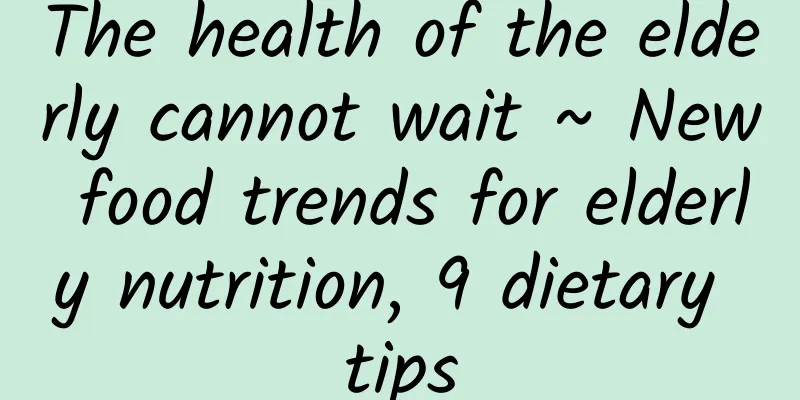The health of the elderly cannot wait ~ New food trends for elderly nutrition, 9 dietary tips

|
"An old person in the family is like a treasure." As Taiwan enters an aging society, the health of the elderly is becoming more and more important. According to the results of the National Nutrition and Health Status Change Survey from 2013 to 2014, the prevalence of insufficient calorie intake among the elderly is 42%, and the overall nutrient deficiency rate is as high as 50 to 70%. According to the survey results from 2013 to 2015, the top two food categories with the highest prevalence of insufficient intake among the elderly are milk (81.6%) and fruit (72.9%). Therefore, how to ensure that elderly people eat nutritious, healthy and live longer is an issue worthy of concern! In view of the survey results on changes in the nutritional health status of the nation in recent years and the common nutrition-related health problems that the elderly face, we can adopt the following "Dietary Tips for the Elderly" to provide immediate symptomatic treatment to improve the nutritional problems of the elderly! 【Diet tips for seniors 1】-Equal emphasis on both quality and balanced diet Like other adults, the elderly should pay attention to eating a balanced and adequate diet every day. According to the "Daily Diet Recommendations for People Over 65" published by the Ministry of Health and Welfare (such as Figure 1), they should eat the six major food groups in appropriate amounts. It is especially recommended that the elderly should consume sufficient protein foods (such as beans, fish, meat, eggs, milk, etc.) every day to ensure that the protein intake reaches the recommended amount of 1.2 grams per kilogram of body weight per day to prevent the occurrence of sarcopenia. 【Diet tips for seniors 2】- Maintain proper body posture Research points out that in pursuit of longevity and health, the elderly should not regard body mass index (BMI) as the most important health indicator. What the elderly should pay more attention to is actually muscle mass. Under stable control of blood sugar and blood pressure, it is recommended that the elderly maintain an "overweight" body position (BMI of about 24-27) to store capital for fighting diseases. BMI = [weight (kg) ÷ height (m) squared] 【Diet tips for seniors 3】- Eat small meals frequently If the elderly often feel bloated and have no appetite, it is recommended to eat until 60% to 80% full at each meal, and prepare some small snacks such as fruits and milk to supplement the meal. You should also eat less fried, oily or gas-producing foods (such as red beans, sweet potatoes, onions, etc.) to improve the feeling of fullness. 【Diet tips for seniors 4】- Adjust food textures appropriately If the chewing ability has decreased due to loose teeth, you can prepare soft, finely chopped or liquid foods that do not require much chewing to facilitate eating. If the swallowing ability deteriorates, a doctor or speech therapist should be required to evaluate and recommend appropriate food texture and type (such as adding food thickeners or tube feeding, etc.) to increase food intake. 【Diet tips for seniors 5】-More coarse food, less refined food It is recommended to use "original" whole grains instead of refined grains as the staple food for all three meals, or to use unrefined whole grains as the staple food for at least one of the three meals (for example: brown rice, whole wheat steamed bread and other whole wheat products, oats, millet, quinoa, sweet potatoes, taro, etc.). You can also add milk to oatmeal, add semi-vegetarian dishes, replace juice or desserts with fresh fruits... and follow the "five fruits and vegetables a day" principle. You should consume three servings of vegetables (1.5 bowls) and two servings of fruit (2 fist sizes) every day to meet your dietary fiber needs. 【Diet tips for seniors 6】-Replenish water at the right time Drink 6-8 glasses of water and beverages every day (240c.c. per glass, including: fresh milk, soup, juice, tea, etc.). To avoid having to go to the bathroom at night and affecting sleep, the elderly are encouraged to drink more water during the day and reduce their water intake after dinner. It is recommended that the elderly should eat more high-fiber foods and drink enough water, and have moderate daily activities to improve constipation problems. [Diet tips for seniors 7] - Nutritional calcium supplements and active sun exposure To reach the recommended daily calcium intake for the elderly (1000 mg), you should choose foods high in calcium (such as milk and dairy products, dried fish, tofu, sesame seeds, almonds, green vegetables, bone soup with a small amount of vinegar or lemon juice, etc.). Vitamin D can help calcium absorption. The elderly should take in balanced and appropriate nutrition, engage in appropriate physical activities and get enough sun exposure to avoid or slow down the occurrence of osteoporosis. 【Diet tips for seniors 8】- Light taste, happy and comfortable Elderly people are advised to "eat light food, avoid eating too salty food, eat less pickled food, and use dipping sauces in moderation." Daily sodium intake should be limited to less than 2,400 mg (about 6 grams of salt). And follow the principles of the DASH diet, choose foods high in calcium, potassium, magnesium, fiber, and unsaturated fatty acids, control saturated fatty acid intake, and achieve the goal of controlling blood pressure through a variety of nutrients. It is recommended to choose more unrefined whole grains, fish, nuts, dark green vegetables, fruits, vegetable oils and other foods. 【Diet tips for seniors 9】-Eat more vegetables and less red meat Foods such as offal, livestock (such as cattle, sheep, and pigs), and solid oils (such as butter, coconut oil, and lard) are rich in saturated fatty acids, which can increase blood cholesterol levels and the risk of cardiovascular diseases such as atherosclerosis. Leaner meats should be chosen in moderation, and white meat (such as fish and poultry) is better than red meat (such as livestock). Eggs are rich in protein and have the best quality protein of all foods. They can be said to be a cheap and nutritious food. It is recommended that generally healthy people can eat one egg a day. One egg yolk contains about 250 mg of cholesterol. People with high blood cholesterol, a history of arterial infarction, obesity or fatty liver are advised to pay attention to their egg intake and should consume less than one egg yolk a day. For the elderly and their families, how to obtain balanced and sufficient nutrition through eating an appropriate amount of food to achieve the goals of living a happy and healthy life, improving body functions and maintaining a good quality of life is an important issue. We call on everyone to pay attention to the issue of promoting nutrition and health for the elderly, and move towards a new era of nutrition for the elderly! |
Recommend
TOP20 quick weight loss foods ranking! (Down)
TOP/11 Sweet potatoes Sweet potatoes are rich in ...
Tips for routine examination of bacterial vaginosis
Gynecological diseases have always been a threat ...
How to alleviate uncomfortable symptoms such as dysmenorrhea through diet and meridian regulation?
Dysmenorrhea is a common physiological problem fo...
Is the cost of treating endometrial tuberculosis expensive?
Is the cost of treating endometrial tuberculosis ...
Will the uterine fluid be absorbed automatically?
Uterine effusion can be divided into physiologica...
What are the precautions after medical abortion? Know it early and benefit early
There are many things that women need to pay atte...
Not uncommon! US temporarily bans imports of South Korean shellfish
Since the end of May, the Taipei City Health Bure...
What are the early symptoms of pelvic peritonitis?
As a common gynecological disease, many female fr...
Two principles for hot spring bathing and eating good food to prevent obesity
"Bathing in hot springs" to fight the w...
Can B-ultrasound check the thickness of the endometrium?
Can B-ultrasound check the thickness of the endom...
Pelvic inflammatory disease seriously endangers women's health
Experts say: The most serious impact of pelvic in...
What fruits can patients with pelvic effusion eat?
What fruits can patients with pelvic effusion eat...
Do you know what causes dysmenorrhea?
Menstrual cramps are something that many women kn...
Childhood obesity may have adverse effects on cardiopulmonary fitness! Different exercise recommendations based on test results
In the past two years, many countries have adopte...
What are the specific hazards of endometrial tuberculosis?
Medical investigations have found that endometria...









